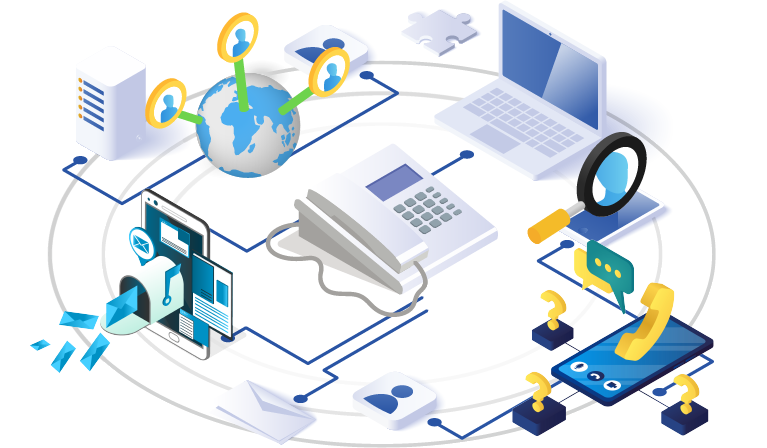Cloud-based PBX best for remote work
Many South African IT employees are choosing to work remotely rather than from the office, a new study has found — even though it’s safe to return to work.
The study shows that although working remotely has increased the workload on employees, it’s still the most preferred working environment. And although ‘teleworking’ creates its own challenges for management, who initially thought there would be decline in productivity, remote working is bringing out more from employees in nearly a quarter of instances.
This data might be the answer to why cloud phone systems are growing rapidly in popularity. A cloud phone system offers the same functionality as traditional phones and so much more. Cloud technology lets businesses operate from anywhere, providing the ideal platform for a remote working environment.
Because a cloud-based PBX (Private Branch Exchange) system uses the internet to make calls, it doesn’t require nearly as much hardware as a traditional phone system. It also allows employees to make or take calls from anywhere on any internet-enabled device.
What’s the difference between Cloud PBX and Voice over Internet Protocol (VoIP)
The term “cloud PBX” and “VoIP” are often used synonymously, but they are slightly different. All cloud-based phone exchanges are also VoIP systems, but not all VoIP systems are cloud-based.
VoIP stands for voice-over-internet-protocol and has been around well before cloud-based systems became mainstream. The first VoIP systems were custom configured and installed over company servers, and therefore were not stored in the cloud. However, this was awkward to set up and maintain, so over time, cloud-based VoIP became the norm. Cloud-based VoIP systems are hosted over a VoIP provider’s servers, which handle call routing and signal processing on a business’s, alleviating the need for an in-house IT team.
A traditional business phone system uses an on-site PBX to route calls to the appropriate number or extension. A business is generally responsible for the PBX’s physical upkeep. Calls are transmitted through on-site networks of copper wires and switches, rather than the internet.
Why is cloud so popular?
There are many advantages to using a cloud phone system over a traditional system. If employees need to make business calls remotely, or if a business is experiencing accelerated growth, a cloud-based phone system is more suitable.
In addition, cloud offers many more useful features and integrations. The result is a more seamless experience to both customers and employees, particularly in a remote environment.
Features and integrations
Most cloud-based phone systems come with a variety of useful features for your business. Our Cloud PBX provides even more features than a traditional PBX phone system, though. And it’s easy to set up – so no technical expertise is required.
Onsite and cloud PBX provide rich calling features that show who’s calling before you answer, or allow you to redirect calls, follow an extension or perform call hold or transfers. Good systems provide call conferencing features, as well do not disturb functionality and detailed call logs with robust reporting.
Other key features are call centre features, voice mail, hunt lists, and a digital receptionist or IVR. The key attraction is the ability to manage queues, customize music on-hold or recordings and create real-time reporting.
However, with Cloud PBX you have the added benefit of remote access. You can have all the features of an onsite PBX and log in anytime, from anywhere.
There are quite a few advantages to using a Cloud PBX, over and above this. A critical feature is that you are not dependent on a single Internet connection or network infrastructure. Cloud PBX providers have resilient networks that are built to handle failover, and what’s more is that the systems are accessed remotely, negating the need for onsite technical support. Especially in cases where loadshedding or internet failure impacts business, having Cloud PBX is particularly advantageous.
It can save you money. Businesses switch to cloud-based systems because they’re often less expensive than traditional phone systems.
It can be used from anywhere. Since cloud-based phones use the internet, a business can take or make calls from anywhere that has an internet connection. This means they’re a lot more remote-work friendly than traditional phones, which require you to be in a specific location.
It can be more reliable. Cloud-based phones are hosted through data networks that rely on multiple servers in different locations. If one server goes down, the service can be transferred to a different server, leaving the business uninterrupted.
It is more scalable. Since they’re software-based, more lines can easily be added. With a traditional phone service, adding new lines can be more expensive and cumbersome.
It means low maintenance. Cloud-based phones can be updated to reflect the latest technology relatively quickly, whereas traditional phones can’t.
You can integrate them into other tools a business uses. For example, cloud-based phones can integrate with customer relationship management (CRM) systems and keep track of every call.
Overall, a Cloud PBX in today’s remote or hybrid workplace is a necessity. If you’d like to learn more about Wanatel’s Cloud PBX, please visit Register page | Wanatel South Africa



